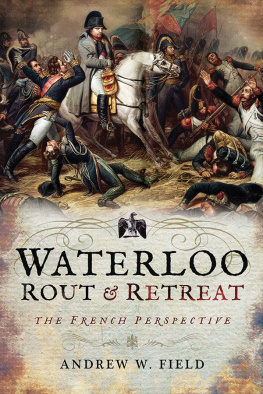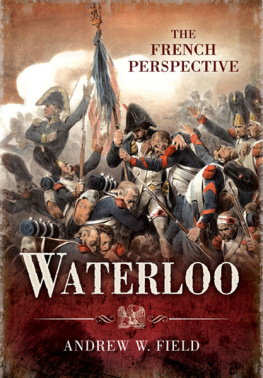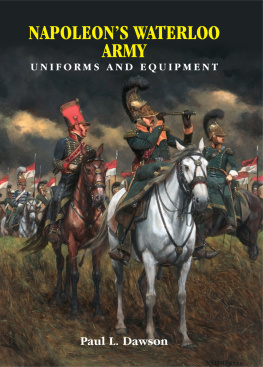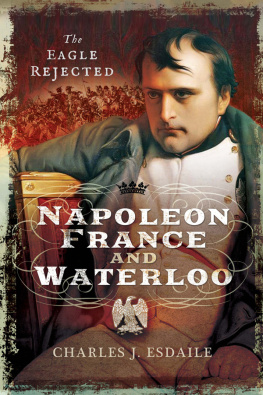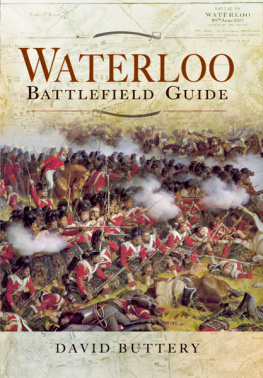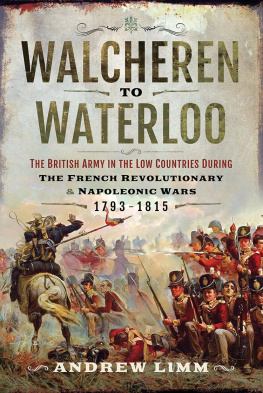
Waterloo: Rout and Retreat
The French Perspective
ANDREW W. FIELD
First published in Great Britain in 2017 by
Pen and Sword Military
an imprint of
Pen and Sword Books Ltd
47 Church Street
Barnsley
South Yorkshire S70 2AS
Copyright Andrew W. Field, 2017
ISBN 978 152670 171 8
eISBN 978 152670 173 2
Mobi ISBN 978 152670 172 5
The right of Andrew W. Field to be identified as the author of this work has been asserted by him in accordance with the Copyright, Designs and Patents Act 1988.
A CIP record for this book is available from the British Library
All rights reserved. No part of this book may be reproduced or transmitted in any form or by any means, electronic or mechanical including photocopying, recording, or by any information storage and retrieval system without permission from the Publisher in writing.
Pen & Sword Books Ltd incorporates the imprints of Pen & Sword Archaeology, Atlas, Aviation, Battleground, Discovery, Family History, History, Maritime, Military, Naval, Politics, Railways, Select, Social History, Transport, True Crime, Claymore Press, Frontline Books, Leo Cooper, Praetorian Press, Remember When, Seaforth Publishing and Wharncliffe.
For a complete list of Pen and Sword titles please contact
Pen and Sword Books Limited
47 Church Street, Barnsley, South Yorkshire, S70 2AS, England
E-mail:
Website: www.pen-and-sword.co.uk
List of Maps
Map 1: The Rout from Waterloo
Map 2: Grouchys Retreat to Namur
Map 3: The Fighting around Namur
Map 4: Operations on 21 June
Map 5: Operations on 22 June
Map 6: Operations on 24 June
Map 7: Operations on 25 June
Map 8: Operations on 26 June
Map 9: Operations on 27 June
Map 10: The Fighting around Villers-Cotterts
Map 11: The Arrival of the Army at Paris
Map 12: The Operations around Paris on 29 June
Map 13: The Fighting at Rocquencourt and Versailles, 1 July
Map 14: The Fighting at Meudon and Svres, 2 July
Introduction
Such is the French soldier: endowed with much intelligence, he soundly assesses his situation and is rarely mistaken on the capacity and operations of his leaders; but his raging imagination, which so often renders him capable of the most heroic acts, also often leads him astray. Then, the less he can distinguish the danger, the more he exaggerates it, pre-occupied by the illusions that overcome him, he no longer sees the resources or the means of salvation that remain to him, or fails to use them.
This is the fourth and final book in my series looking at the Waterloo campaign almost exclusively from the French perspective. It covers a little-known, and little written-about, aspect of the campaign; the rout of Napoleons army that had been catastrophically defeated at the great battle; the attempts to rally it at Laon and Soissons and its retreat on Paris; Grouchys far more orderly retreat after the Battle of Wavre and his concentration with the remnants of the Emperors army; Napoleons own flight and abdication; the combats around Paris; the retreat across the Loire and the final disbandment of the Imperial army; all of which marked the end of the imperial era and the First Empire.
Like my other books, my aim, as far as is possible, is to tell the story through the eyes of those officers and other ranks that were witnesses to these monumental events. Without it being a deliberate approach, I find that in this volume I have used much longer pieces of text from eyewitnesses or official correspondence than in the others. There is often much fascinating detail in the original scripts that is not revealed in summaries and I also believe it gives a more authentic feel to the narrative rather than paraphrasing and allows the writer to tell the full story; I hope the reader feels the same.
As in the introductions to the earlier books, I must remind readers of the inevitable bias, often poor recall or personal agendas of these writers, but even so, their first-hand testimony gives life and some intriguing insights into these events. As this book covers a much longer period than the others, the junior officers in particular wrote perhaps more on this aspect of the campaign than on their personal experiences on a single day of battle. Even so, I have quoted much more official correspondence in this volume than in the others because it is in this, rather than the somewhat more biased individual accounts, that the true state of the army is revealed during this period of the campaign. It will be noted that I have drawn heavily on Grouchys works as he published much of his own correspondence and also a copy of the official Registre of the major-gnrals correspondence. These letters and orders are fundamental in understanding this phase of the campaign and should be a starting point for a serious study of events, although there are some mistakes and perhaps even deliberate falsehoods to be found in them. The rout of the Arme du Nord from Waterloo was undoubtedly a deep humiliation to the French nation, and yet more so to the individual officers and men who were a part of it. It is therefore unsurprising that many of them wanted to play down the effect on their own units which had all shared in the glory of many years of victory. This is particularly true of the Imperial Guard, whose conduct during the retreat is written about with contempt by many who were not a part of it.
Whilst many soldiers deserted after the battle in the shock and devastation of defeat, and many more at the news of Napoleons abdication, others rallied stoically to their regiments and were again prepared to sacrifice their lives in the defence of their country. It is of particular interest that we have accounts from officers and soldiers across the whole spectrum of responses; from desertion, to joining Louis XVIIIs entourage as he advanced in the wake of Wellingtons army, to those that continued the fight. There are also a number of moving accounts by those who experienced the disbandment of their illustrious regiments and the final, tearful farewells of those who had fought and lived together in good times and in bad, who had shared that close military bond of friendship and the experiences from the horrors of the battlefield to the challenges of day-to-day living in the most uncomfortable circumstances.
Although there were no major battles during this period, there was rather more fighting than is generally believed. The retreat was marked by a series of skirmishes as the Prussians in particular tried to cut the French off from Paris and complete their total defeat. It is true that most of those were fought by French troops that had been psychologically crushed and physically disorganized by their defeat at Waterloo and were somewhat one-sided. However, as the army got closer to Paris, and had been joined by reinforcements and Grouchys small, undefeated army, the French put up much stiffer resistance in the defence of their capital in an effort to prevent a second victory parade by foreign troops in as many years. Indeed, one of the final combats resulted in a notable French victory.
Some of the material in the first chapter will be familiar to those that have read my Waterloo book, but given the title of this final volume, I felt it was impossible not to repeat some of it to ensure vital context for the rest of the story. I apologise for this, but can reassure the reader that I have included new material and presented it in a way to set the scene for this final phase of the campaign.
Next page
